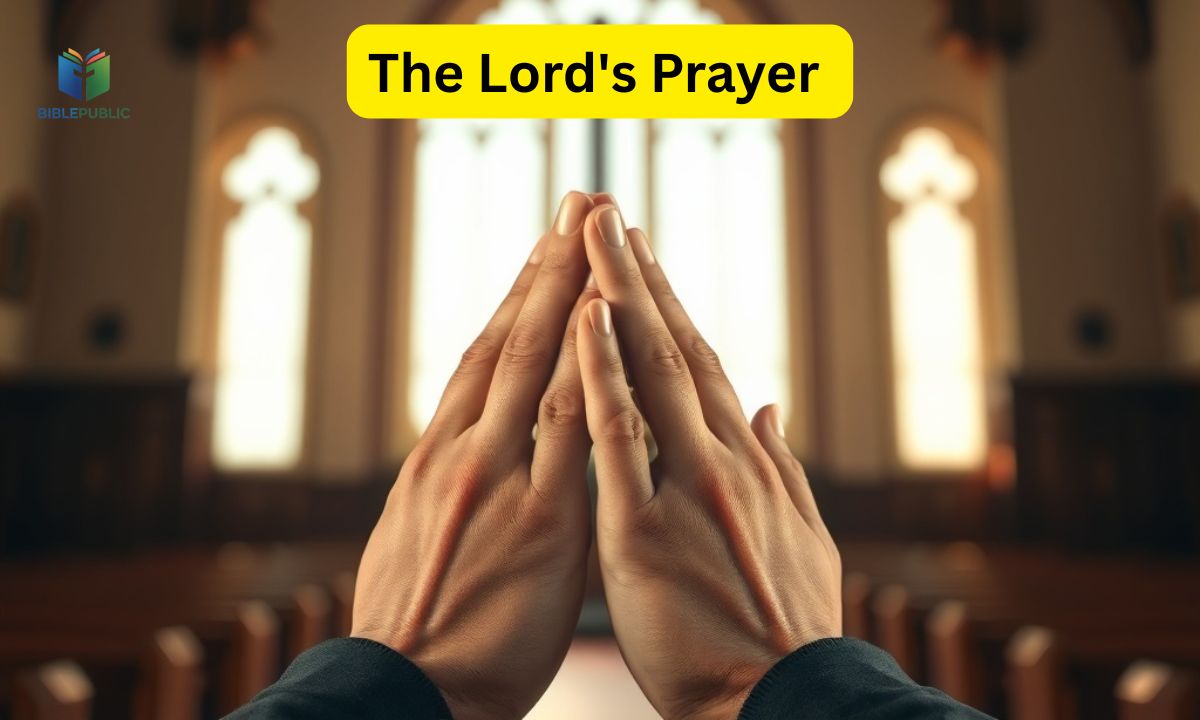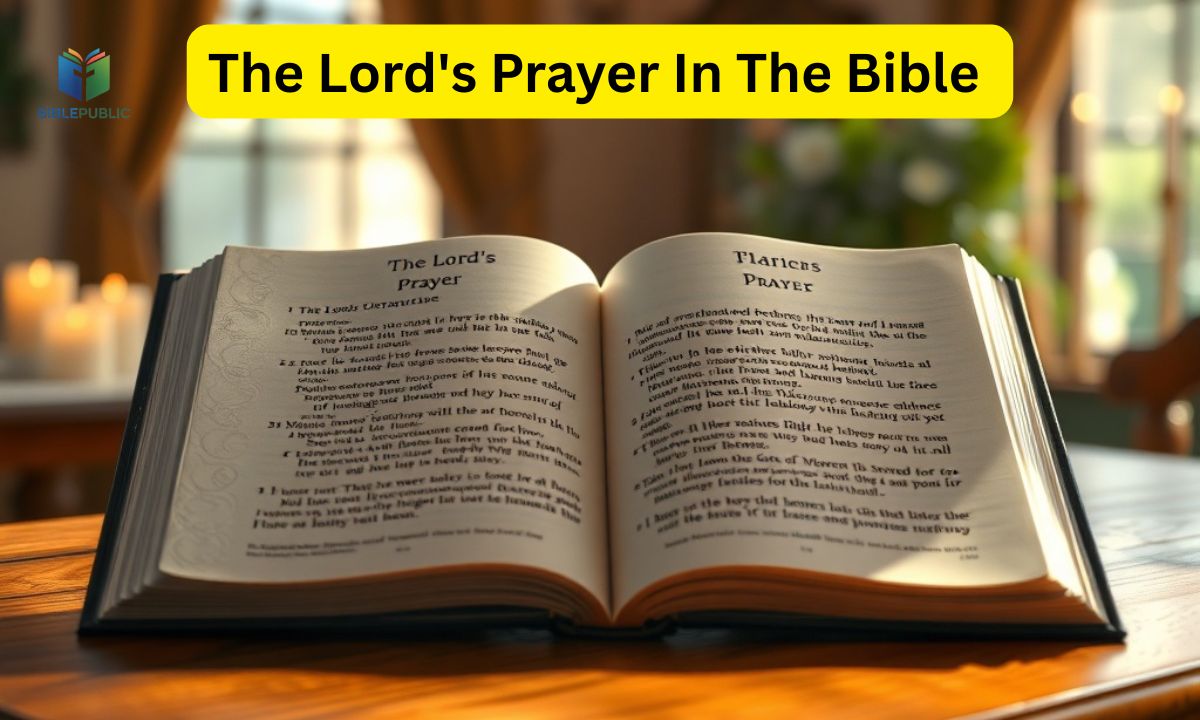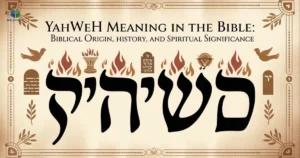The Lord’s Prayer remains Christianity’s most transformative guide for connecting with God on a deeper level. Taught by Jesus during the Sermon on the Mount, this sacred prayer has shaped Christian faith practice for over two millennia. Found in Matthew 6:9-13, these powerful words weren’t just meant for memorization—they were designed to revolutionize how believers communicate with their Abba Father.
Each phrase carries profound wisdom about worship, surrender, provision, and forgiveness. Whether you’re a seasoned believer or just beginning your spiritual journey, understanding this prayer unlocks spiritual growth and brings peace to daily life. It’s more than a ritual; it’s a relationship blueprint that transforms hearts.
What Is The Lord’s Prayer in the Bible?

The Lord’s Prayer is Christianity’s most powerful guide for talking with God. Jesus taught this prayer during the Sermon on the Mount, completely changing how people connect with the Almighty. You’ll find these sacred words in Matthew 6:9-13 and a shorter version in Luke 11:2-4, shaping Christian faith practice for over two thousand years.
Here’s the thing religious leaders back then loved showing off with long, fancy prayers that impressed crowds. Jesus cut through that pretense. He taught His followers to have honest, heartfelt conversations with their Abba Father instead. This wasn’t about memorizing words. It was about building a real relationship through prayer meditation that reaches heaven itself.
| Scripture Location | Version Details | Key Context |
| Matthew 6:9-13 | Full version with doxology | Taught during Sermon on the Mount |
| Luke 11:2-4 | Shorter version | Response to disciples’ request |
The Full Text of The Lord’s Prayer (Matthew 6:9–13)
These ancient words still speak powerfully to anyone seeking spiritual growth and a deeper connection with God. Throughout history, these verses have strengthened martyrs, comforted the grieving, and sparked spiritual revivals. Every single phrase holds profound truth waiting to be discovered.
“Our Father which art in heaven, Hallowed be thy name. Thy kingdom come, Thy will be done on earth, as it is in heaven. Give us this day our daily bread. And forgive us our debts, as we forgive our debtors. And lead us not into temptation, But deliver us from evil: For thine is the kingdom, and the power, and the glory, forever. Amen.”
The Meaning of Each Line in The Lord’s Prayer
“Our Father who art in heaven” – Knowing God as our loving Father
These opening words break down walls between us and God. When we call Him “Father,” we’re acknowledging a personal, loving relationship instead of cold formality. The Aramaic word “Abba” means something like “Papa” or “Daddy.” Worship and adoration start when we recognize we’re God’s beloved children.
“Hallowed be Thy name” – Honoring the holiness of God
The meaning of “Hallowed be thy name” is about treating God’s name with deep respect and reverence. His name represents everything He is His character, power, and divine nature. We’re called to speak about God with honor in every situation, recognizing His perfect holiness.
“Thy kingdom come” – Inviting God’s will into our lives
This line asks God to establish His rule, not just in heaven, but right here on earth. It starts in our own hearts when we commit to faith and devotion. God’s will comes first, above our wants, society’s expectations, or temporary situations. Heaven’s values show up when we surrender control to Christ.
“Thy will be done on earth as it is in heaven”
This is where we let go of control and trust God’s wisdom, even when we don’t understand. How The Lord’s Prayer transforms your life becomes clear when you choose obedience over doing things your way. God’s perfect patterns come to life through people who humbly trust Him.
“Give us this day our daily bread” – Trusting God for daily needs
Daily bread means both the food we eat and the spiritual nourishment we need to thrive. Focusing on today’s needs helps us worry less about tomorrow’s uncertainties. One of the benefits of praying The Lord’s Prayer daily is learning gratitude for what God provides each moment.
“Forgive us our trespasses” – Learning mercy and forgiveness
The connection between prayer and forgiveness couldn’t be clearer. We receive God’s pardon while extending the same grace to others. Forgiveness and mercy flow both ways, healing broken relationships and freeing our hearts from bitterness. We confess our wrongs before experiencing restoration in God’s grace.
“Lead us not into temptation” – Seeking divine protection
We need constant prayer for strength because spiritual battles are real. This petition asks God to protect us from situations where we might fall into sin and to shield us from evil influences. It acknowledges our weakness while accessing God’s unlimited power. Wisdom to spot danger comes with asking for deliverance.
“For Thine is the kingdom” – Acknowledging God’s eternal glory
The prayer ends where it began with worship and adoration. This closing statement affirms that all power, authority, and honor belong to God alone forever. When we frame our requests this way, we remember who’s really in control. Confident trust grows from knowing God holds all circumstances.
Why The Lord’s Prayer Is So Powerful
Spiritual reflection through this prayer opens doors to life-changing encounters with God. It reshapes your priorities, softens your heart, and aligns your desires with His purposes. Regular practice deepens your relationship with the Father while building rock-solid faith based on His character. Prayer for peace flows naturally when you rest in God’s care.
How to understand The Lord’s Prayer meaning requires seeing its power goes way beyond words. It transforms how you live every single day. Studies actually confirm that structured prayers like this reduce anxiety, improve concentration, and support mental health when practiced with intention. This becomes a blueprint for relationship, not just religious ritual.
| Spiritual Benefits | Practical Impact |
| Deepens intimacy with God | Changes daily decisions |
| Builds strong faith | Relieves stress |
| Grows gratitude | Heals relationships |
| Encourages forgiveness | Provides spiritual protection |
The Lord’s Prayer for Youth and Beginners
Young people often find old-fashioned prayer language difficult to relate to their real-world challenges. How to teach The Lord’s Prayer to children starts with updating the language without watering down its meaning. “Our Father” becomes the most perfect parent you can imagine. “Hallowed be thy name” simply means God deserves our total respect.
A step-by-step guide to The Lord’s Prayer includes practical ways to handle peer pressure, figure out who you are, and deal with worries about the future. Saying it before school sets your spiritual focus for the day. Journaling helps you discover what each line means for you personally. Social media reminders and modern worship songs make memorization easier for today’s generation.
Teaching The Lord’s Prayer to Kids and Families

Creative teaching turns memorization from boring homework into an exciting family journey that builds spiritual growth across generations. Learning one line each day, using pictures and hand motions, helps kids remember faster. Setting the words to tunes everyone knows makes ancient words feel accessible and fun.
Understanding the historical background of The Lord’s Prayer through age-appropriate stories shows why Jesus taught The Lord’s Prayer to His followers. Art projects about each phrase, acting out the meanings, and nature walks discussing God’s provision all deepen understanding. A “forgiveness jar” gives kids a hands-on way to practice releasing grudges mentioned in the prayer.
| Age Group | Focus Areas | Teaching Methods |
| Ages 3-5 | Father God, daily provision | Pictures, songs, repetition |
| Ages 6-9 | Forgiveness, holiness | Stories, art, acting |
| Ages 10-13 | Surrender, temptation | Discussions, journals, real life |
| Teens | Practical application | Group talks, current issues |
Lessons We Learn from The Lord’s Prayer
Spiritual lessons from The Lord’s Prayer begin with humility recognizing we’re dependent children, not self-sufficient adults. Praising God before asking for things realigns our view when we’ve made life all about ourselves. Surrender becomes faith’s highest expression when we trust God’s wisdom over our own understanding.
Daily dependence fights the illusion we can handle everything ourselves. It reminds us we need God every single day, not just during crises. Forgiveness and mercy connect inseparably. Receiving grace means we must extend the same compassion to others. Awareness of spiritual battles prepares us for real fights that need supernatural help and protection.
Also Read: 30 Opening Prayer for Online Class with Scriptures
How to Pray The Lord’s Prayer Daily
Morning routines that include prayer meditation on each phrase build a spiritual foundation before your day’s challenges begin. The benefits of praying The Lord’s Prayer daily multiply through consistent practice rather than occasional use. Finding a quiet spot without distractions helps you focus on genuine communion with God.
Evening reflections let you review how the prayer’s principles showed up in your day. You’ll identify growth areas that need attention. Prayer for strength and wisdom goes hand-in-hand with honest confession about where you fell short. Balance that with gratitude for God’s faithfulness you witnessed. Weekly exercises explore individual lines through journaling, listing God’s attributes, and finding ways to serve.
| Daily Practice | Weekly Focus | Monthly Review |
| Morning prayer | Monday: God’s love as Father | Check spiritual growth |
| Evening reflection | Tuesday: God’s character | Find transformation areas |
| Quiet listening | Wednesday: Service chances | Celebrate wins |
| Gratitude journal | Thursday: Recognizing provision | Set new goals |
Bible Verses That Relate to The Lord’s Prayer
God as Our Father:
Psalm 103:13 beautifully shows how Abba Father has compassion for His children, just like earthly parents show tender love. “Like as a father pitieth his children, so the LORD pitieth them that fear him.”
Romans 8:15 confirms we’ve received the Spirit of adoption, letting us call out “Abba, Father” without fear. “For ye have not received the spirit of bondage again to fear; but ye have received the Spirit of adoption, whereby we cry, Abba, Father.”
God’s Holiness:
Isaiah 6:3 shows angels declaring God’s holiness, echoing “Hallowed be thy name” throughout heaven. “Holy, holy, holy, is the LORD of hosts: the whole earth is full of his glory.”
Psalm 99:9 calls believers to exalt God and practice worship and adoration toward His sacred nature. “Exalt the LORD our God, and worship at his holy hill; for the LORD our God is holy.”
God’s Kingdom and Will:
Matthew 6:33 tells us to seek God’s will and righteousness before pursuing anything else. “But seek ye first the kingdom of God, and his righteousness; and all these things shall be added unto you.”
Romans 12:2 challenges us to transform our thinking so we can understand God’s good and perfect will. “Be not conformed to this world: but be ye transformed by the renewing of your mind, that ye may prove what is that good, and acceptable, and perfect, will of God.”
God’s Provision:
Philippians 4:19 promises God will supply every need we have according to His riches in glory. “But my God shall supply all your needs according to his riches in glory by Christ Jesus.”
Psalm 23:1 assures us that following the Great Shepherd means we’ll never lack daily bread. “The LORD is my shepherd; I shall not want.”
Forgiveness:
Ephesians 4:32 reinforces forgiveness and mercy as central to our relationships and healing. “Be ye kind one to another, tenderhearted, forgiving one another, even as God for Christ’s sake hath forgiven you.”
Colossians 3:13 commands us to forgive others’ grievances, following Christ’s example toward us. “Forbearing one another, and forgiving one another, if any man has a quarrel against any: even as Christ forgave you, so also do ye.”
Protection from Evil:
James 4:7 promises the devil will flee when we resist temptation through God’s strength. “Submit yourselves therefore to God. Resist the devil, and he will flee from you.”
1 Peter 5:8-9 warns about spiritual warfare, urging vigilance and prayer for strength against enemy attacks. “Be sober, be vigilant; because your adversary the devil, as a roaring lion, walketh about, seeking whom he may devour.”
God’s Glory:
Revelation 4:11 declares God worthy to receive all glory, honor, and power forever. “Thou art worthy, O Lord, to receive glory and honour and power: for thou hast created all things.”
Psalm 115:1 redirects glory from human achievements to God’s name, which deserves all praise. “Not unto us, O LORD, not unto us, but unto thy name give glory, for thy mercy, and for thy truth’s sake.”
The Lord’s Prayer in Everyday Christian Living
How The Lord’s Prayer transforms your life shows up when forgiveness principles change how you handle conflicts. Instead of holding onto grudges, you extend the same grace God gives you every day. “Thy will be done” becomes your filter for every major choice: career paths, relationships, money decisions, and daily priorities.
Daily bread trains your eyes to notice God’s provision in both small and large ways. From meals on your table to new opportunities to meaningful relationships, you’ll start seeing His hand everywhere. Worship and adoration through “Hallowed be thy name” keeps your prayers from becoming selfish wish lists. “Thy kingdom come” motivates you to serve your community, pursue justice, and love your neighbors, reflecting Christ’s character.
Short Reflection on The Lord’s Prayer
Spiritual reflection on these ancient words connects you with two thousand years of believers who trusted these same promises. Persecuted Christians in Roman catacombs, medieval monks in monasteries, and modern worshipers in churches worldwide share this prayer. It transcends denominational boundaries. This is a relationship blueprint, not just religious duty.
Distance from God melts away when you return to these foundational words. They offer a roadmap back to intimacy with Him. Anxiety fades when you meditate on “daily bread.” Bitterness crumbles when you remember to “forgive as we forgive.” Temptation loses its grip when you cry out “deliver us from evil” and access supernatural strength. Let this ancient prayer become your daily rhythm breathing in God’s presence, breathing out your burdens.
Conclusion
The Lord’s Prayer in the Bible teaches us how to connect deeply with God through faith and humility. It reminds us to trust His will, seek forgiveness, and depend on Him for our daily needs. Each line holds a powerful message that strengthens our spiritual life and brings peace to the heart.
When we pray The Lord’s Prayer, we grow closer to God and learn to live with kindness and gratitude. It guides us to forgive others, stay faithful, and walk in God’s love every day. This simple yet powerful prayer continues to inspire believers around the world.
Frequently Asked Questions
What is the full version of the Lord’s Prayer?
The full version appears in Matthew 6:9-13 and includes the doxology: “For thine is the kingdom, and the power, and the glory, forever. Amen.”
Is Matthew 6:9-13 the Lord’s Prayer?
Yes, Matthew 6:9-13 contains the complete Lord’s Prayer that Jesus taught His disciples during the Sermon on the Mount.
Where exactly is the Lord’s Prayer in the Bible?
The Lord’s Prayer is found in two locations: Matthew 6:9-13 (full version) and Luke 11:2-4 (shorter version).
What is the correct way to say the Lord’s Prayer?
Pray it slowly with sincerity and understanding, focusing on each phrase’s meaning rather than rushing through the words mechanically.
Why do we say “hallowed be thy name”?
“Hallowed be thy name” means we honor and revere God’s holy name, recognizing His sacred character and showing Him the respect He deserves.

Mark, founder of BiblePublic.com, shares inspiring insights on the Bible, blessings, and prayer. His mission is to encourage faith, deepen understanding, and help others walk closely with God daily.









